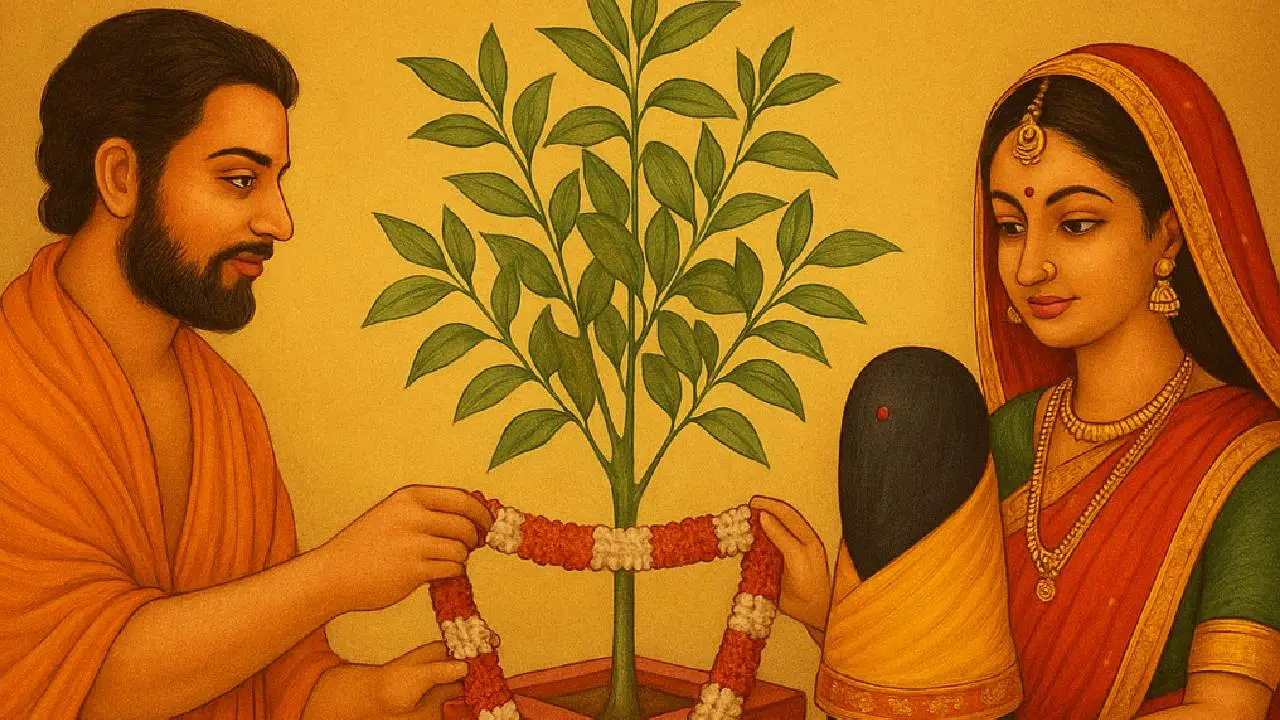
(Credit: OpenAI)
New Delhi : According to the Hindu calendar, Kartik Shukla Dwadashi Tithi will begin on November 2 at 7:31 AM and end on November 3 at 5:07 AM. Astrologers say that performing the Tulsi-Shaligram marriage on November 2 is most auspicious since the Dwadashi Tithi and favorable yogs align on that day. Hence, Saturday, November 2, 2025, is considered the ideal time for Tulsi Vivah this year.
This year, two powerful yogas will coincide with Tulsi Vivah. As per Drik Panchang, Tripushkar Yog will last from 1:00 PM to 10:33 PM on November 2, followed by Sarvartha Siddhi Yog from 10:34 PM to 5:34 AM on November 3. These yogas amplify the blessings of any holy act performed during their period, making this year’s Tulsi Vivah especially sacred and spiritually rewarding.
The Tulsi-Shaligram wedding is conducted much like a traditional Hindu marriage. The sacred basil plant is adorned as a bride, and Lord Shaligram is treated as the groom. A mandap (wedding altar) is decorated, and rituals like Kanyadaan, vows, and prayers are performed. The ceremony marks the symbolic end of Chaturmas and the resumption of all auspicious and festive activities across homes and temples.
According to scriptures, performing Tulsi Vivah brings peace, prosperity, and good fortune to the household. It is believed to cleanse sins, bless devotees with children, and lead the soul toward liberation. Married couples observing this ritual are said to attain eternal marital harmony, while unmarried devotees are blessed with a suitable life partner and happiness.
Tulsi Vivah is celebrated a day after Dev Uthani Ekadashi, the day when Lord Vishnu awakens from his four-month-long divine rest known as ‘Yog Nidra.’ The day symbolizes the reawakening of divine energies and marks the return of auspicious times. It is believed that performing Tulsi Vivah right after this divine awakening multiplies the spiritual merits manifold.
At home, devotees clean the courtyard, decorate the Tulsi pot with new clothes and ornaments, and draw rangolis. A small idol or picture of Lord Shaligram or Vishnu is placed beside Tulsi. The wedding mantras are chanted, diyas are lit, and sweets are offered as prasad. Families then exchange gifts and distribute prasadam to neighbors and relatives.
Tulsi Vivah is not just a ritual but a celebration of devotion and divine union. Performing it with faith is said to invite peace, harmony, and happiness in life. Those who organize this wedding are believed to receive the same blessings as performing an actual human marriage. Spiritually, it symbolizes the union of nature and divinity, reminding devotees that purity and faith can transform every home into a temple of joy.





Copyright © 2026 Top Indian News
